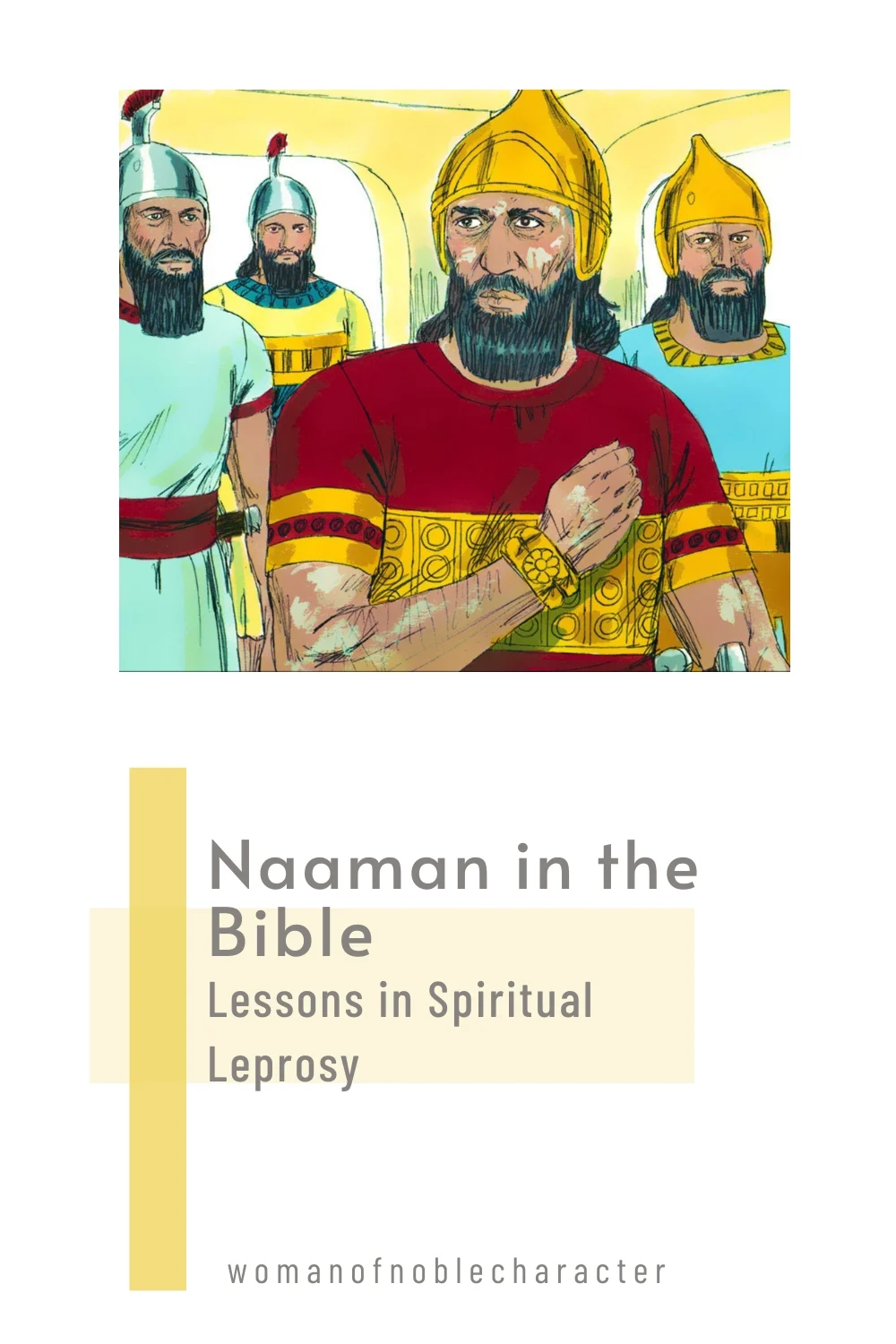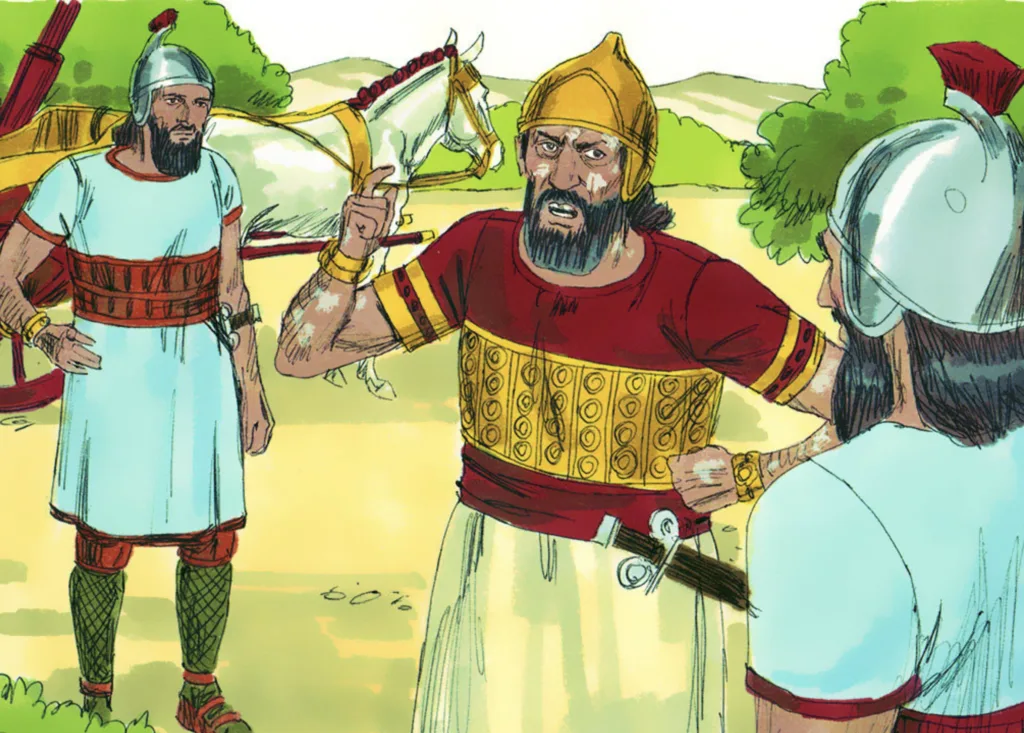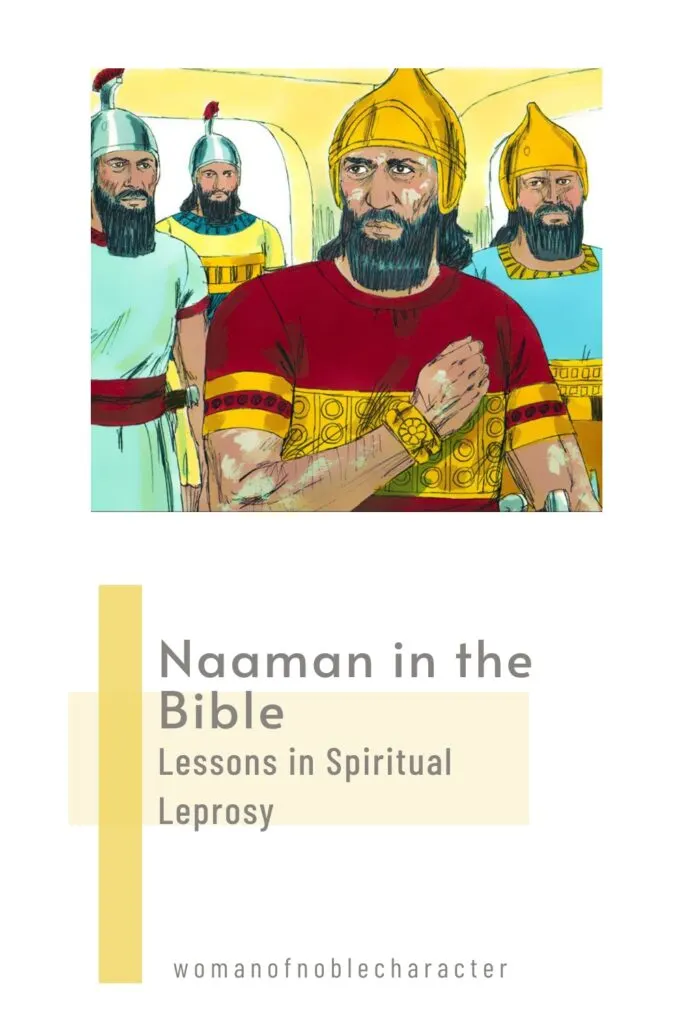This page/post may contain affiliate links. As an Amazon Associate, as well as an affiliate of other programs, this means if you purchase something using these links, I will receive a commission on qualifying purchases at no cost to you! For more detailed information, please visit our Affiliate Disclaimer page
Some of you may have learned about Naaman in the Bible at Sunday school. For others, this Bible character may be new to you.
You may recall how this man with leprosy found healing after washing himself in the Jordan River seven times, as instructed by the prophet Elisha. Miraculously, his skin was fully restored. (2 Kings 5).
If you don’t recall the story (or even if you do),
Sunday school often overlooked the historical context of figures like Naaman, but his story is filled with timeless truths about humility, salvation, and how it relates to the Gospel.
As we explore his story, let us heed the greater message and be forever changed.
So let’s explore the story of a Syrian man’s journey to find healing through the prophet Elisha and delve into the essence of his personhood.

In doing this, we will gain insight into how to live as righteous Christians and how to access the divine power of healing.
The wealth of this Syrian man is made clear in 2 Kings 5:1. As a prominent figure in his society, his affluence would have been well-known and respected by the people of his time. For Christians, this story is a reminder of the importance of acknowledging God’s provision in all of our lives, no matter our station.
Naaman, commander of the army of the king of Syria, was a great man with his master and in high favor, because by him the Lord had given victory to Syria. He was a mighty man of valor, but he was a leper.
2 Kings 5:1 (ESV)
His army command was in Aram. Aram resides in present-day Syria.
Although he was a successful and brave warrior, he was afflicted with a dreaded disease: leprosy.
According to Wikipedia, leprosy is, “primarily a granulomatous disease of the peripheral nerves and mucosa of the upper respiratory tract; skin lesions are the primary external sign. Left untreated, leprosy can be progressive, causing permanent damage to the skin, nerves, limbs, and eyes. Contrary to folklore, leprosy does not cause body parts to fall off, although they can become numb or diseased as a result of secondary infections; these occur as a result of the body’s defenses being compromised by the primary disease. Secondary infections, in turn, can result in tissue loss causing fingers and toes to become shortened and deformed, as cartilage is absorbed into the body.”
The form you have selected does not exist.
Naaman needed more than just medical attention; he required a heavenly remedy. No earthly doctor could provide the supernatural cure he desperately sought—only the miracle-working power of God could save him.
Anyone of us could relate to Naaman’s need for divine intervention; after all, only the Lord grants us true healing.
Tragically, as a consequence of this sickness, he was cut off from his family and community and cast into a life of isolation and solitude.
For a man of strong faith, it must have felt like a great test of his spirit and virtue. Yet, as a man of great faith, he never lost hope for a miracle.
Outcasts from society, lepers were some of the most despised in ancient cultures – no one wanted to be near them for fear of contagion.
Jesus, however, went against the grain; in Luke 17:11-19 we can read of His compassion as He draws near to those affected by leprosy and even touches them.
By doing so, He showed us that even the “unclean” is worthy of being acknowledged and brought into the community.
Naaman, known for his wealth and power, was held back by one thing: a lack of good health. Even the humblest of slaves steered clear of him.
Feeling desperate and helpless, Naaman turned to the King of Aram for help. When that failed to provide a solution, he sought out the prophet Elisha, whose miraculous powers had already been proven.
A servant girl, an Israelite in captivity in Aram, brought news of a prophet who had arrived in Samaria with miraculous healing power.
Naaman eagerly heard the message; this could be his chance to cure his disease.
Namaan, having achieved high social standing, must have expected special treatment, so it was no surprise he was insulted when Elisha commanded him to bathe in the Jordan River.
Having made the long journey in his chariots, the thought of having to go for a dip in the water was not what he had in mind. Nonetheless, he followed Elisha’s instructions and was greatly rewarded.
This story of Namaan serves as a reminder for Christians today: God is sovereign and His ways are often higher than ours; even the simplest of tasks can yield a great reward when done in obedience to Him.
Christians should pay close attention to the fascinating societal dynamics at work in the story.
Naaman, arrived by chariot at Elisha’s doorstep seeking a miracle. Despite his wealth and power, he humbly asked for a healing, trusting that the prophet could provide the answer.
Naaman’s status and riches were of no consequence in his faith that Elisha could perform a miracle.
He stands at the door of Elisha’s house, humbling himself and pleading for a miracle of healing. He is hoping Elisha will meet his need and make him whole again.
When Naaman, a powerful Syrian commander, sought healing for his skin condition, Elisha, the prophet of God, had a different plan than what Naaman expected. Elisha sent a messenger to instruct Naaman to bathe in the Jordan River—a place that was dirty and unpalatable. Naaman’s ego was insulted not once, but three times: first by the messenger, then by the Jordan River, and finally by a seemingly miraculous cure (2 Kings 5:12). God used Elisha to humble Naaman and teach him about His power. A powerful reminder to all us Christians that God’s ways are not our ways.
Are not Abana and Pharpar, the rivers of Damascus, better than all the waters of Israel? Could I not wash in them and be clean?” So he turned and went away in a rage.
2 Kings 5:12 (ESV)
The prophet’s directions to Naaman pointed to something more than the visible leprosy — an ailment of pride.
Naaman could not expect to be healed of his own selfish desires. To be restored to full health, he had to humble himself and turn to God.
The prophet was showing Naaman that when we have physical or spiritual leprosy (a leprosy of pride that deadens our conscience), we need to rely on how the Lord plans to heal us, instead of how we envision the healing should go.
Why Didn’t Naaman Like Elisha’s “Cure”?
Naaman dislikes the cure for several reasons.
At first, the wealthy Naaman felt affronted by Elisha’s request for him to cleanse himself in the Jordan River. The affluent man was used to having his underlings do his “dirty work” for him.
As a person of stature, Naaman expected a dignified treatment. But instead, Elisha directed him to the Jordan River – a commoner’s bath – to cure his leprosy. Naaman was embarrassed, having put on a show of worshiping Elisha, and humbling himself, only to be given a simple, humble command.
For a Christian audience, this can serve as a reminder of the importance of humility and the sacredness of all peoples and their lives.
Third, Naaman was a man accustomed to issuing commands, not to being commanded. He had no doubt expected that the prophet Elisha would offer a magical remedy to his affliction – something that would immediately remove the leprosy from his body, not something that would require the simple and seemingly trivial action of washing in the Jordan River.
When his servants urged him to take a dip in the Jordan River, Naaman had little hope that it would bring about healing. Yet, when he emerged from the water, his leprosy was completely gone!
Naaman was still bothered by one thing. Part of his responsibility as commander of the Syrian army was to accompany the king to the temple of Rimmon, a pagan god of Syria. As the king worshiped, Naaman was to be at his side.
In this matter may the Lord pardon your servant: when my master goes into the house of Rimmon to worship there, leaning on my arm, and I bow myself in the house of Rimmon when I bow myself in the house of Rimmon, the Lord pardon your servant in this matter.”
2 Kings 5:18 (ESV)
Naaman, recognizing Rimmon as a false god, sought forgiveness from the Lord before his miraculous healing. Elisha, a prophet of God, encouraged Naaman that all was well and that God had seen his faith-filled heart (2 Kings 5:19). Naaman returned to Syria, joy-filled and healed, as a result of his newfound faith.
As a sign of gratitude, Naaman attempts to offer Elisha a gift. But, Elisha, being devoted to God, declines. His servant, recognizing the prophet should receive some recompense for his work, accepts two talents – worth around $800,000 – as an exchange.
Elisha was so angry he cursed his servant, leaving him with Naaman’s leprosy for the rest of his days.
What Lessons Can We Learn from Naaman?
Naaman’s pickiness may be easy to judge, yet it is understandable given his circumstance. After all, the Bible tells us God had answered his prayer and provided the cure he so desperately needed. Despite this, Naaman hesitated to accept it at first.
Though it was not what he had expected, he eventually realized that God’s way was best and humbly followed Elisha’s instructions. For Christians, Naaman’s story is a reminder to trust in God and accept His plan, even when it isn’t what we had imagined.
We can certainly relate to the Aram commander when we take a closer look.
1. God Doesn’t Operate on Our Terms
Namaan thought that if he acted faithfully and followed all of the necessary steps, Elisha would take pity on him and grant him an outstanding recovery. Despite his doubts, he was willing to put his faith into action in the hope of being healed.
As Christians, it’s important to remember that God’s grace and blessings are not something we can earn. Regardless of how much we give of our time and money to serve our communities and take communion, our actions can’t be used as a bribe—God has a grand plan for us all, and nothing we do can influence His decisions.
2. Salvation Works the Same for Everyone
In Matthew 20:1-16, Jesus tells an inspiring parable about a generous vineyard owner who offers a day’s wages, the denarius, to workers in need of employment.
Those who had worked the longest assumed they’d receive a larger portion, only to be disappointed when they realized that each and every person was given the same pay – causing them to grumble in dissatisfaction.
His kindness and generosity extended throughout the work day right up until the very last hour. This story is an incredible reminder of God’s never-ending grace and provision for all His children. It’s a beautiful reminder of His abundant love, available to all who seek it.
The parable of salvation demonstrates how, regardless of when an individual accepts Jesus Christ as their Lord and Savior, they will always receive the same divine salvation.

Many Christians, like the older brother in Jesus’ parable of the prodigal son, may feel indignant for not receiving greater recognition for their devoted faith. However, this perspective overlooks the unconditional love God has for all His children, no matter how, or how long, their faith is expressed.
In the parable of the vineyard, Jesus reveals His unending grace and undying mercy. No matter our economic or spiritual state, forgiveness is freely bestowed upon all of us, allowing us entry into the kingdom of heaven. Our pathway to salvation is open to anyone—whether they chose to accept it in their childhood or on their deathbed.
Indeed, the Lord grants all the same invaluable gift of grace.
Just like Naaman in the Bible, it takes humble submission to cleanse us from our spiritual impurities. By humbling ourselves before God, we can receive spiritual cleansing that transcends our earthly struggles.
3. God Doesn’t See Any Distinctions
Naaman, despite his wealth and status, was powerless against his leprosy. Loneliness and isolation surrounded him, trapping him in his own world – even the lowliest of servants shied away from the dreaded disease. Yet, he found hope.
Naaman’s miraculous healing teaches us an undeniable truth: that earthly riches and possessions don’t define our eternal worth. As Jesus said in Matthew 6:19-21, our treasures in Heaven far outweigh any wealth on Earth. And with that in mind, God doesn’t differentiate between the rich and the poor – He calls us all to accept salvation through Him.
Do not lay up for yourselves treasures on earth, where moth and rust destroy and where thieves break in and steal, but lay up for yourselves treasures in heaven, where neither moth nor rust destroys and where thieves do not break in and steal. For where your treasure is, there your heart will be also.
Matthew 6:19-21 (ESV)
The form you have selected does not exist.
Like Naaman, we might be tempted to try and buy a miracle from God, expecting Him to do as we ask. But in the same way, we all need to be healed from our spiritual leprosy, so too do we need to accept and trust in His terms. (Joshua 3).
Like Naaman, we all need a cure for our brokenness – the only remedy being salvation from Jesus Christ.
This is a gift freely given to whoever desires it, healing us from the inside-out and allowing us to experience a life that is truly fulfilling.
Do you struggle to trust God in the face of uncertainty? I know I do.
After all, God’s plans often don’t line up with what we would prefer in the moment—but that’s because He sees the entire “big picture” with perfect clarity, while we can never quite get the full picture no matter how hard we try.
When we are in the midst of tough times, it’s important to remember that God knows exactly what he’s doing.
Obeying God can often seem like an unreasonable task, full of doubt and second guessing. But I can testify that I have never once regretted trusting Him and placing my faith in His wisdom. As a Christian, I’ve experienced the joy that follows putting my faith in God, and I know you can too.
The story of trust is an emotional one. When we trust, we must surrender and obey before we understand. We must set aside our pride and receive God’s provision on His terms. Such a powerful lesson to take away.
Proverbs 3:5-8 (ESV) gives us the message in an easy-to-understand way:
Trust in the Lord with all your heart,
Proverbs 3:5-8 (ESV)
and do not lean on your own understanding.
In all your ways acknowledge him,
and he will make straight your paths.
Be not wise in your own eyes;
fear the Lord, and turn away from evil.
It will be healing to your flesh
and refreshment to your bones.
To cultivate trust in our lives, we must surrender ourselves to God’s Word and allow it to direct our actions. We may not understand the purpose of obedience, but its fruits are abundant.
God knows what we are capable of and never commands us to do anything that would be too difficult for us. He takes us through each step, leading us to reliability and trustworthiness. His goodness is undeniable, and He is always on our side.
Through Naaman’s story, we are reminded that faith and obedience bring God’s blessing, even when the path we must take is difficult and humbling. A great leader, Naaman offers timeless lessons for us today: humbly embrace God’s direction, no matter the cost; courageously follow His will, even when it is unfamiliar; and gratefully accept His grace, no matter the circumstances. As the Bible says:
Delight yourself in the Lord,
Psalm 37:4 (ESV)
and he will give you the desires of your heart.
May we all learn from Naaman and find joy in following God’s will.
Here is a video you may enjoy about the story of Naaman in the Bible:
You may enjoy these resources for further study:
Naaman Was A Leper: A Picture of Pain and a Promise of Possibility by Glenn J. Branham
A Journey to Wholeness: The Gospel According to Naaman’s Slave Girl (The Gospel According to the Old Testament) by Mark Belz
Naaman’s Faith: An 8-Day Bible Study Devotional for Women Based on the Account of Naaman (2 Kings 5) (The Faith Series Devotionals for Women) by Mary Jane Humes
ESV – “Scripture quotations are from The ESV® Bible (The Holy Bible, English Standard Version®), copyright © 2001 by Crossway, a publishing ministry of Good News Publishers. Used by permission. All rights reserved.”

